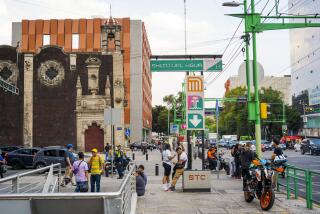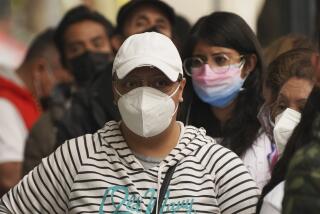Mexico flu outbreak hits businesses big and small
- Share via
MEXICO CITY — The sudden absence of customers makes Rocio Antonio’s flower stand look downright funereal. Neighboring businesses -- a candy stand and a tool seller -- appear equally forlorn.
Antonio said her sales had tumbled since the swine flu outbreak brought this normally thrumming city of more than 20 million people to a near-standstill a week ago. She is not alone. Across Mexico City, thousands of restaurants, cinemas, nightclubs, coffeehouses and other businesses have temporarily closed or watched the flow of customers slow to a trickle.
As Mexico grapples with a flu outbreak suspected in the deaths of more than 170 people, it is beginning to tally the damage to an economy already creaking under the pressure of a global financial crisis and a violent drug war that has scared away tourists.
“The timing could not be worse. With the economic environment that we find ourselves in, having one of these diseases becoming such a threat is really bad news,” said Enrique Bravo, a Washington-based consultant who specializes in Mexican affairs. “Everything will be a function of how long this lasts as an epidemic.”
No one knows the answer to that, of course, making it difficult to gauge the probable economic harm. But President Felipe Calderon on Wednesday urged “nonessential” businesses to close Friday -- the start of a long holiday weekend -- through Tuesday, probably crimping commerce even further.
A national industrial federation said it supported the stoppage, but left it to companies to decide what to do. Some major manufacturers, including Ford, said they would comply. But the national council of maquiladoras, the assembly plants clustered mainly along the U.S. border, said they needed to stay open to fill orders.
Mexico’s finance minister, Agustin Carstens, said this week that the flu crisis could cause a half-percent drop in Mexico’s gross domestic product. But he expressed hope that the damage would be short-lived, judging from previous disease outbreaks, such as SARS in Asia a few years ago.
“The pattern that we saw in Asia and that we hope to replicate in Mexico is that after a drop of that size, there would be a rebound of that size too,” Carstens told reporters. He said the government would spare no expense in confronting the outbreak.
The global financial crisis has already left Mexico’s economy struggling from cuts in its exports of automobiles and electronic goods, especially to the United States, its main trading partner.
The central bank projected this week that the economy could shrink as much as 4.8% this year, a significant blow. That is more pessimistic than its previous forecast and the new figure did not include any flu-related toll. Some economists have been offering even gloomier predictions.
With officials seeking to prevent the H1N1 flu virus from spreading, large gatherings have been limited, and that has hit the service and entertainment industries especially hard.
Soccer teams are playing before TV cameras, but in empty stadiums. Movie theaters are shuttered. Normally busy restaurant zones have gone quiet as Mexico City Mayor Marcelo Ebrard imposed new restrictions this week that limit eateries to takeout service. Hotels report cancellations and falling occupancy.
The Mexico City Chamber of Commerce estimated that businesses in the capital were losing more than a third, or $56 million, of their sales each day.
The restrictions on eateries have prompted an outcry from owners, who say the rules could endanger 450,000 jobs in their restaurants, many of which are mom-and-pop businesses that operate on a shoestring even during the best of times.
“If the businesses stay closed, the workers, the waiters don’t get wages or tips. It’s a worse crisis for our workers. They live day to day,” said Francisco Mijares Noriega, president of a national restaurant industry group.
Ebrard defended the restrictions as necessary to fight the spread of flu, even if they are unpopular.
“The actions we have taken are in line with a maximum alert,” he said.
The city has offered about $4 a day in relief to about 35,000 waiters hurt by the closures.
It probably will be hard to quickly repair the damage to Mexico’s tourist industry, which already faced concerns among many would-be travelers about drug-related violence that left more than 6,000 people dead last year.
Mexico’s tourism minister, Rodolfo Elizondo, said the blow to the industry would be “very strong.”
The U.S. has warned its citizens against coming to Mexico during the outbreak. Hotels in key tourist resorts reported a sharp drop in bookings, and news reports included images of foreign tourists jamming the airport in Cancun in a rush to get out.
Analysts say it will take a strong and sustained push by the government, along with irresistible bargains, to revive tourism, one of the country’s top three sources of foreign income.
But government rescue policies seem faraway abstractions among the small-time merchants who continue offering their wares on Mexico City’s now-quiet streets.
Candy seller Maria Patricia Galan said her most reliable customers, children, had vanished because parents were keeping them inside amid flu-related school closures. On a recent afternoon, she kept busy by dusting and arranging plastic bags of colorful sweets and nuts -- for no one.
Antonio, the flower vendor, said her daily earnings had plunged to about $70. She told her only employee to stay home. She said she had no plans to close. But she was braced for an uncertain future.
“We’ve never had a disease like this,” she said. “I think it’s going to take awhile for things to go back to normal.”
--
More to Read
Sign up for Essential California
The most important California stories and recommendations in your inbox every morning.
You may occasionally receive promotional content from the Los Angeles Times.










